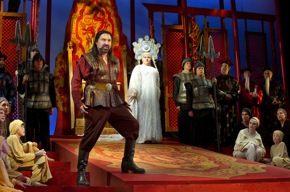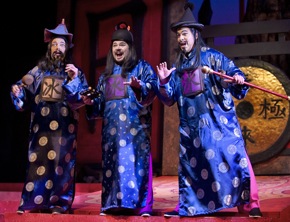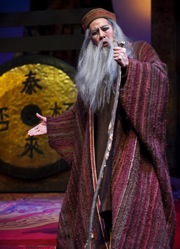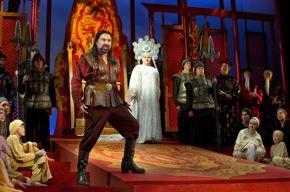It's astonishing for a veteran of too many Turandot performances to keep count of to find one of the best in Palo Alto (pop. 60,000).

Photos by Steve DiBartolomeo
Yet, tiny West Bay Opera once again conquered a musical Goliath. At the Sunday matinee, José Luis Moscovich conducted a cohesive, balanced, and engaging performance, conveying the very heart of the work. The old warhorse pranced and raced around as a young filly.
Squeezed into a 77-year-old, 425-seat community theater, the WBO presented grand opera not in a grand manner, but delightfully and commandingly well.
Moscovich must have known, but he chose to ignore the impossible nature of his mission:
First, that Turandot is an opera spectacular, one that requires large forces, luxurious sets, and costumes on a big stage. It's hard enough just to imagine — much less to create — the Imperial Palace, the court, and the people of this "mythical place in the Far East" (what happened to "Peking"?) behind a proscenium opening 26 feet wide and 13 feet high.
Second, that it must have, at minimum, a good orchestra, a better chorus, some excellent soloists, and two exceptional singers for the top roles.
And third, and perhaps the biggest obstacle, is the opera's transparency. Most of the audience could hum along with the music (and some unfortunately always do), so if the performance is just a little bit off, the audience will know it.

Taking the last point first: almost nothing was off in the WBO presentation. During some of the big choral numbers (by two dozen singers representing both the court and the people), there were momentary glitches in the orchestra staying together, but Moscovich corrected that instantly.
And the orchestra, with concertmaster Kristina Anderson, numbering only 30 and squeezed into the smallest of makeshift pits, made Puccini sing, even without the singers. The clear, lyrical, passionate orchestral sound was to be treasured.
First and second violin sections of just three musicians each, the two cellos playing gorgeously, fine woodwinds, most of the brass most of the time made the score come alive and wash over the full house — all in perfect balance, while not overdoing it. For the opera's big moments, it would have been all too easy to try to bring down the ceiling, but Moscovich never once permitted loud, much less noisy, to substitute for forte.
This was true about the singers as well, something that must have taken some doing. David Gustafson, as Prince Calaf, has a big voice, he is also a heldentenor-in-the-making, and yet he was satisfied just singing beautifully, instead of joining the "look at me how loud I can be" school. With a bit more training as an actor, Gustafson's impressive presence — combined with his voice and mastery of the music — will make him a star.
It takes more than an hour for Turandot to sing her first note, but when Alexandra LoBianco launched into "In questa reggia," the wait was well rewarded. Musically and dramatically, the soprano presented a more complex character than the usual ice princess, she convinced listeners of a believable vulnerability under the armor. She sang the lyrical-to-heroic range with the ease and magnetism of a young Montserrat Caballe.

Will LoBianco achieve Caballe's artistry at the height of the great soprano's career? Time and luck will tell. But at this point she already has both — lyric and dramatic — fachs to a highly unusual degree.
She too managed to stay musical, even at the cost of taking the sound down a notch, even in the big climactic moments. It's a small theater — "singing small" is an absolutely necessity, especially as LoBianco and Gustafson both showed the reserve power in their command.
Adam Paul Lau's sonorous Timur and Liisa Dávila's simple, understated Liu made major contributions to the performance. Ping (Emmanuel Franco), Pang (Michael Desnoyers), and Pong (Michael Mendelsohn) sang so well they did not overstay their welcome during their big number (Act 2, Scene 1), which has some beautiful music that's not part of the hit parade, but runs about twice in length what it should be.
The small chorus, usually not one of the strengths of WBO, did exceptionally well. Moscovich blended voices and instruments in such a way that the opera's gestalt rose above individual performances, and the music hit in the chest, slightly left of center. Yes, this was a Turandot that got to you, instead of making the audience think, evaluate, and distance itself from the stage.
Peter Crompton's simple but impressive sets and Callie Floor's opulent costumes added to the overall impact of the production. David Cox's direction was smooth, with occasional slight missteps (such as the unending shtick of servants carrying chairs behind the fast-moving Ping-Pang-Pong trio wherever they went).
This David-conquers-Goliath production, especially its musical excellence, was no fluke. Moscovich has already managed such bold undertakings as La forza del destino, The Flying Dutchman, Pique Dame, Macbeth, and others — all surprisingly grand small productions.
It's a pleasant and important fantasy to imagine what WBO could do in a larger, better facility, with a front-of-house management that would rise above high-school auditorium values. Currently (and historically), basic logistical challenges such as getting the audience in and out of the theater utterly defeat the well-meaning but incompetent volunteer ushers.

